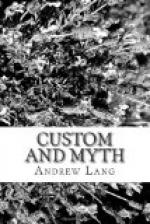We have contested, step by step, many of Mr. Muller’s propositions. If space permitted, it would be interesting to examine the actual attitude of certain contemporary savages, Bushmen and others, towards the sun. Contemporary savages may be degraded, they certainly are not primitive, but their legends, at least, are the oldest things they possess. The supernatural elements in their ideas about the sun are curiously unlike those which, according to Mr. Muller, entered into the development of Aryan religion.
The last remark which has to be made about Mr. Muller’s scheme of the development of Aryan religion is that the religion, as explained by him, does not apparently aid the growth of society, nor work with it in any way. Let us look at a sub-barbaric society—say that of Zululand, of New Zealand, of the Iroquois League, or at a savage society like that of the Kanekas, or of those Australian tribes about whom we have very many interesting and copious accounts. If we begin with the Australians, we observe that society is based on certain laws of marriage enforced by capital punishment. These laws of marriage forbid the intermixing of persons belonging to the stock which worships this or that animal, or plant. Now this rule, as already observed, made the ‘gentile’ system (as Mr. Morgan erroneously calls it) the system which gradually reduces tribal hostility, by making tribes homogeneous. The same system (with the religious sanction of a kind of zoolatry) is in force and has worked to the same result, in Africa, Asia, America, and Australia, while a host of minute facts make it a reasonable conclusion that it prevailed in Europe. Among these facts certain peculiarities of Greek and Roman and Hindoo marriage law, Greek, Latin, and English tribal names, and a crowd of legends are the most prominent. {236} Mr. Max Muller’s doctrine of the development of Indian religion (while admitting the existence of Snake or Naga tribes) takes no account of the action of this universal zoolatry on religion and society.
After marriage and after tribal institutions, look at rank. Is it not obvious that the religious elements (magic and necromancy) left out of his reckoning by Mr. Muller are most powerful in developing rank? Even among those democratic paupers, the Fuegians, ’the doctor-wizard of each party has much influence over his companions.’ Among those other democrats, the Eskimo, a class of wizards, called Angakuts, become ’a kind of civil magistrates,’ because they can cause fine weather, and can magically detect people who commit offences. Thus the germs of rank, in these cases, are sown by the magic which is fetichism in action. Try the Zulus: ‘the heaven is the chief’s,’ he can call up clouds and storms, hence the sanction of his authority. In New Zealand, every Rangatira has a supernatural power. If he touches an article, no one else dares to appropriate it, for fear of terrible




